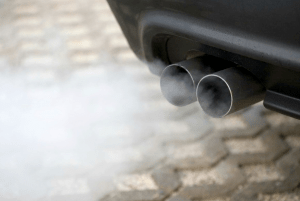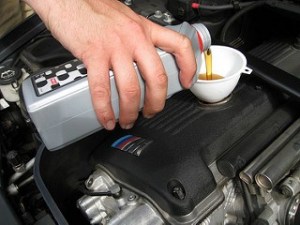
by admin | Apr 18, 2019 | Brakes
Spring is always a welcome sight, especially after a harsh winter. Our landscape certainly lends itself to scenic drives. Of course, there’s always spring and summer baseball season for the kids and all sorts of weekend activities that require a lot of back and forth driving. There’s certainly no time in anyone’s schedule for unexpected car repairs. That’s why we put together these 7 tips on how to get your vehicle ready for summer.
The simplest way to avoid engine problems, is to make sure you take care of regular vehicle maintenance. Following these 7 tips will make sure your vehicle is running its best for summer driving:
- Oil and Filter Change – Changing the engine oil and filter when required will extend engine life by making sure vital parts are well-lubricated. Use a high-quality oil and filter – it’s worth the extra cost. If the oil and filter has been changed recently, at the very least, check the level and condition of the oil once a month. This is especially important if your vehicle is older. If you find you have to frequently add more oil, there is most likely a problem that needs to be addressed.
- Other Vital Engine Fluids – When did you last check the transmission fluid? Is the coolant able to protect your engine from overheating this summer? Most people don’t think of checking the other fluids in their vehicles. This can lead to problems down the road as fluids begin to get old and break down. For example, coolant that is old won’t be able to prevent overheating and parts in the cooling system will start to corrode leading to premature failure of cooling system parts. When checking the level and condition of fluids, follow the instructions in the owner’s manual. If you’re not sure how to check the fluids, no need to worry. We will check them for you when you bring your vehicle in for an oil service.
- Tires – Change out your snow tires. If you are using all-season tires, have them rotated. Replace tires that show signs of excessive wear.
- Wiper Blades – Rough winters can wreak havoc on wiper blades. Changing the wiper blades will maximize your ability to see in inclement weather.
- Brakes – Most vehicles allow for easy viewing of the brake pads. If the brake pads are thinning, you will want to have them replaced. If you have any concern about the brakes or you don’t feel comfortable checking the pads yourself, stop by the shop and we can check them for you.
- Vehicle Exterior – Give your vehicle a good wash and wax. When washing, make sure to include the underbody and wheel wells.
- Vehicle Interior – Show the inside of your vehicle some love, too, by vacuuming floor mats and seats, and applying a protectant to leather and vinyl.The best way to avoid unexpected car repair costs is to make sure your vehicle is maintained regularly. The car repair professionals at Campus Repair in Ft. Collins, Colorado are equipped to assist you in this area. Give us a call or stop by the shop to schedule your spring vehicle maintenance.

by admin | Jan 11, 2019 | Auto Repair Northern Colorado, Campus Repair, Exhaust System, Preventive Maintenance
When most people think of the exhaust system, they imagine the tailpipe and muffler. In fact, it’s much more than those two parts and has a very important job to do – protect you and your passengers from being exposed to harmful gases. The system also minimizes pollution in the environment. In this blog post, you will learn about the exhaust system along with some of the signs there’s a problem that requires exhaust system repair. You’ll also learn how you can maintain the exhaust system.
If your vehicle is equipped with a combustion engine, the proper amount of fuel and air is mixed together and ignited at the right time to run the engine. When the fuel/air is ignited, it creates noxious gases that are passed out of the engine and into the environment through the exhaust system. Any number of things can affect the performance of the exhaust system – bad spark plugs, a faulty oxygen sensor, etc. Equally, if any part of the exhaust system is faulty, you are at risk of being exposed to dangerous gases (e.g. carbon monoxide). If you delay any repairs to a faulty exhaust system, you may even begin to feel sick, fatigued, light-headed and more.
The main parts of the exhaust system
There are five main parts that make up the exhaust system. A problem with any one of these parts will affect engine performance and your safety. They are:
- Exhaust Manifold – The exhaust manifold is connected at the cylinder head and collects the gases generated during combustion and delivers them to the exhaust pipe.
- Oxygen Sensor – The oxygen sensor is continually measuring the amount of oxygen that is in the exhaust. The data it collects is then sent to the onboard computer which adjusts the ratio of fuel to air.
- Exhaust Pipes – They begin at the exhaust manifold and send gases through the system where they exit at the tailpipe.
- Catalytic Converter – Just like the name implies, the catalytic converter is responsible for changing the harmful into water vapor and less harmful gases.
- Muffler – This part “muffles” or quiets the explosions that are going on in the engine from the combustion of air and gas.
Signs that exhaust repair is needed
Any of these signs indicate that exhaust repair is needed:
- You notice the smell of exhaust fumes while driving – This is not something to ignore as it is quite dangerous to you and your passengers. The reason you are smelling the exhaust is because there is a leak in the system that is entering the cabin.
- You hear hissing, popping or loud rumbling noises – If your vehicle starts to sound louder and louder with hissing, popping or loud noises coming from underneath, most likely you will need to replace the muffler.
- You are getting less gas mileage – This could mean the oxygen sensor needs to be replaced.
- The exhaust system is plugged – Plugged exhaust is caused by the catalytic converter element breaking down and becoming lodged in the exhaust system. symptoms include poor acceleration, feeling like it is stuck in lower gear and a Check Engine Light. The engine has to have a clear path in and out for air so if the exhaust is plugged it’s like running with your hand over your mouth.
The “Check Engine Light” and the Exhaust System
The Check Engine or the Service Engine Soon light alerts you when there is a problem with your vehicle’s emissions system. The emissions are what is going through the exhaust system so it all plays a role together. If the light comes on and stays on, you should have your vehicle checked and fixed as soon as possible. By delaying Check Engine light repairs, you could end up having to replace more expensive parts, like the catalytic converter.
Maintaining the Exhaust System
Since it’s located underneath your vehicle, there’s not really much you can do to maintain the exhaust system. You can, however, make sure you wash the underside of your vehicle at least once a month, especially in the winter. That’s because the Mag Chloride on the roads will end up causing rust and corrosion. Also, have the exhaust system inspected and fix minor problems before they become costly repairs.
Let Campus Repair assist you with the maintenance and repairs on your exhaust system. When you bring your car, van or truck in for periodic service, we complete a courtesy inspection. If we see a problem with the exhaust system, we’ll let you know so you can take care of it. If you’re having a problem with the exhaust system, give us a call or stop by the shop.

by admin | Dec 10, 2018 | Brakes
Buying a new vehicle is a steep investment. Buying a used one can be, too. The only way to maintain or increase the life of your vehicle is through preventive vehicle maintenance – that’s maintenance that is done to make sure fluids and filters are changed regularly and parts are replaced before they fail. If you want to avoid new car payments or expensive and unnecessary repair bills, a commitment to preventive vehicle maintenance is a must. Here are 8 things you can do that will increase the life of your vehicle.
- Choose high-quality fluids and replacement parts. Yes, you may pay a little more when you receive the service, but you will notice the benefits as your vehicle gets older. High-quality fluids will protect your engine parts better so everything runs better and parts won’t wear out prematurely.
- Make sure you maintain the cooling system on a regular schedule. The antifreeze/coolant is your vehicle’s cooling system does a couple of things. First, it keeps the engine from overheating. Next, the coolant is designed to protect internal engine parts from becoming rusted and corroded. Older fluid can be very detrimental to your engine. It will run hotter and parts will wear out faster. Even worse, if the engine overheats, you could face having to replace the engine… or your vehicle. Along with cooling system maintenance, replace any hoses and belts that are beginning to show excessive wear.
- Service the transmission. When was the last time you checked the level and condition of your transmission fluid? This simple fluid check can tell a lot about what’s going on in the transmission. If you have to add fluid, it smells like it’s burnt, or the fluid color looks dark brown or black, you have a transmission problem. Follow the guidelines in your vehicle’s handbook to know when to service the transmission. If you are towing with your vehicle or place a heavy load on it, you will need to change the fluid and filter more often. An important note of caution… if you have never changed the transmission fluid or filter and your vehicle is approaching 80,000 to 100,000 miles, do not go out and have this service performed. Doing so can stir up dirt and pieces of metal that can cause a problem with your transmission. Check with us before scheduling a transmission service.
- Replace belts before they break. This is especially important when it is the timing belt. Yes, timing belt replacement is expensive; however, if you wait until the belt breaks, you will most likely need to replace the engine or your vehicle.
- Maintain the tires, suspension system and brakes. This is vital. If you drive on under- or overinflated tires, tires that are wearing unevenly, brakes that need to be replaced and/or a suspension system that is showing signs of a problem, you are putting yourself and others at risk. Have the tires rotated every 3,000 to 5,000 miles and replace them when they show signs of excessive wear or the tread depth is low. Check tire air pressure once a month and add air, as needed. Replace brake pads when we let you know it’s needed. If your vehicle is swaying more around turns or vibrating more on bumpy roads, have the suspension system checked.
- Watch for any signs and symptoms that show there’s a problem with your vehicle. If you hear strange sounds when driving, notice fluid leaks under your vehicle or smell something odd when driving, get it checked out.
- If you have a garage, keep your vehicle in it. Vehicles that are garage-kept last longer than those parked outside all the time. Air pollutants cause corrosion, rain and snow cause rust, the sun will fade the plastics and fabrics in the interior.
- Clean the interior and exterior of your vehicle regularly. By keeping the exterior clean and waxing it, you will make sure the paint finish will be protected. It’s also a good idea to hose off the underbody to remove road dirt and salts. Clean and vacuum the interior once a month and apply protectant to vinyl or leather.
The simplest way to make sure your vehicle maintenance is handled regularly is to bring it to Campus Repair in Ft. Collins, Colorado. We keep detailed records of the services we perform on each vehicle. We also conduct a courtesy inspection with each service to let you know if anything needs to be replaced. Call or stop by to have us take care of your next vehicle maintenance.



